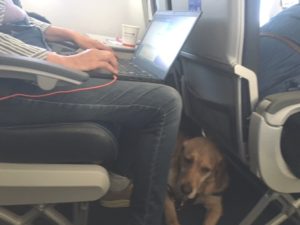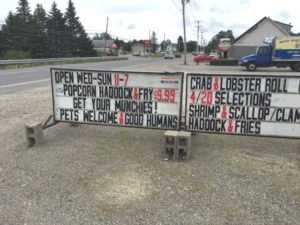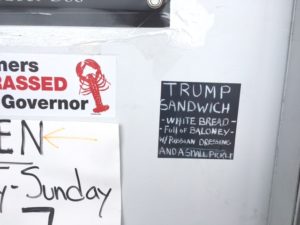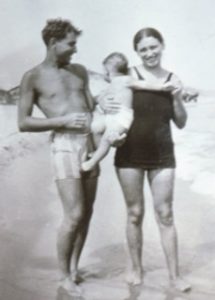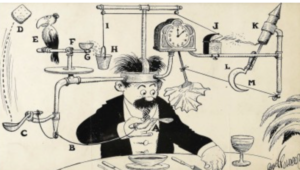Mondays with Mike: At land’s end
July 10, 2017 • 8 Comments • Posted in Mike Knezovich, Mondays with Mike, travel, writingWhen last Beth posted, we’d just had a lobster roll in Machias, Maine.
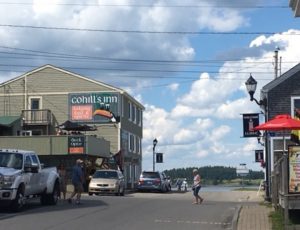
That’s Cohill’s Inn, our home away from home in Lubec.
It only got better. We’re in Lubec, Maine, billed as the easternmost point in the United States. We’re staying at Cohill’s Inn where Glen checks you into your room, mixes your drink, makes your coffee in the morning, and advises on which boat tour to take. You may know I’m a big fan of the movie Local Hero. If you’ve seen it, think Gordon Urquhart.
There is one ATM in town. Cell service is Canadian, so we’ve turned off roaming and are limited to Wifi at the Inn. And that ain’t bad.
The tides are dramatic here, they say 19 feet, and up to 50 feet in Canada. And I believe they’re not exaggerating. Enormous expanses of rock and soil and flotsam and jetsam are exposed and then they disappear, each day.
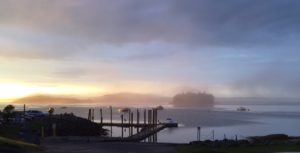
The mist comes and goes.
The tides create Old Sow, the second largest whirlpool in the world according to locals. And I saw it on a boat tour this morning, a wondrous thing. Also wondrous were the seals, the bald eagles, the porpoises and the whale we saw.
Everywhere trees grow out of rocks. It’s verdant and lush and craggy and severe, all at the same time.
Fog comes and goes on its own schedule. One evening a mist rolled in and at sunset the pastel hues floated over forested islands in the distance. It was like living in an impressionist painting.
All reminders that the soul needs natural grandeur. It is informed, enriched, and humbled by the wild.
At the Lubec Brewery, where they add spent brewery grain to sourdough to make pizza crust, we met a man named Roger (that’d be Rah-Jah in localese) who is a roofer by summer, and a fisherman by winter. Roofing is the easy part, the one he likes best. His eyebrows don’t ice up. But he fishes because there isn’t much other work up this way in the winter.
We cross the Canadian border each day when I drop off Beth at her IOTA writing workshop. The Canadian border checkpoint looks like a welcome center. The U.S. checkpoint looks like a rusty toll booth.
Beth’s workshop is at Roosevelt Campbello International Park, where FDR summered with his family as a boy and later with Eleanor and their children. It’s operated jointly by the U.S. and Canadian park services. It’s delightful in the present day and provides some great history lessons.
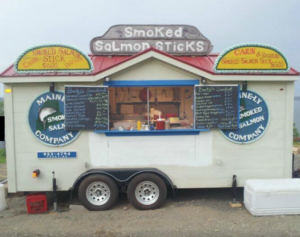
That’s Becky’s.
Back in Lubec, running wild on my own, I’ve had lunch twice at Becky’s, a little trailer supplied with electricity by heavy duty extension cords from Becky’s house. The trailer and house are bayside, that would be Johnson Bay. Beside the trailer is a picnic table, where I ate my lobster roll on day one, and my fried clams on day two. Between the picnic table and the bay were a heap of lobster traps and other fishing gear. My lobster roll was really good. As were my clams.
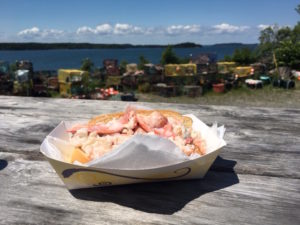
That’s my lobster roll from Becky’s.
The air toggles between the scent of trees and the scent of the sea. I believe I’ve added a few days to my life just by breathing.
On Saturday morning, as we walked to our rental car to head to Campobello, a woman stopped us and asked, “Are you looking for something to do today?” I said I was open to suggestions. She told me that the West Quoddyhead Lighthouse was open for free tours that day, and that there was a small festival celebrating the lighthouse.
After dropping Beth at her workshop, I drove to the lighthouse. I set out in bright sunshine, wishing I’d brought the sunscreen. Two miles later I saw fog ahead. And another three miles later, I arrived at the lighthouse, which was visible, but the waterfront—just 20 yards away—was not. And I could see my breath.
Only five people at a time were allowed to climb the fairly treacherous spiral staircase to the top of the lighthouse. That meant a fair amount of waiting, but time passed quickly because two U.S. Coast Guard members were at the bottom regulating the line. Regaling was more like it. One was from Long Island, and had a tattoo of the Island on his forearm to prove it. He’d started college in Florida as a mechanical engineering student. “But,” he said, “every day my friends would drive by on their way to the beach as I was walking to class. ‘Beach?’ ‘Chemistry class?’”
“And that’s how I joined the Coast Guard,” he laughed. He said he’s eleven credits away from getting his degree. “But I love what I do. I wouldn’t change a thing.”
He asked where I was from and when I told him, he said he’d been stationed in Peoria, of all places. His unit keeps shipping lanes clear and safe, and so they had the Illinois River to worry about. We went on at some length, and to the amazement of others waiting in line, about the invasive Asian Carp and how they fly through the air and sometimes into boats.
His buddy was from Bangor (that’s Bang-gore I’ll have you know), Maine and had been stationed in North Carolina on the Outer Banks, so we had a lot to talk about, too.
They were two of the smartest, nicest, most articulate young men I’ve met. They reminded me of our friend’s son, Scott, who also served in the Coast Guard.
And it occurred to me: The world should seek a treaty whereby the only armed forces and weapons permitted would be equivalent to our current USCG. Just enough to keep people safe and the waters navigable.
It’s a nice dream.
Meantime, there’s Downeast Maine. Which is pretty close .
